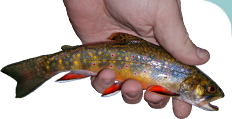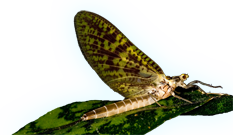Blog & Latest Updates
Fly Fishing Articles
Insects by Common Name


> > White Mayfly ---- Euphron leukon?
| JumpNotZero | September 9th, 2008, 8:06 am | |
| In Cognito Posts: 2 | A friend and I were just fishing a small stream in northern Wisconsin and I saw a few white mayflys, about a size 12 (?) I was struck by the incredibly long tails (TWO tails) on these buggers. The LONG tails - is this conclusive evidence to say they were the E. leukons mayflies & nothing else? Thanks | |
| Always quit when you're through. | ||
| GONZO | September 9th, 2008, 11:30 am | |
Site Editor "Bear Swamp," PAPosts: 1681 | Tim,The LONG tails - is this conclusive evidence to say that they were the E. leukons mayflies & nothing else? In a word...no. I'd guess that the #12 white mayflies with the long tails were male spinners of a group commonly known as "cream Cahills" or "chalk Cahills" (genus Maccaffertium). Male mayflies typically have long tails and long forelegs in the spinner stage. Ephoron is unusual in that the females have lost the molt into spinners. They mate, lay eggs, and die as duns. The females have three "normal length" tails. The two-tailed males do molt into spinners, and that molt is usually timed to coincide with the emergence of the female duns. In their seeming haste to shed the dun covering, the males are often seen flying with the whitish dun shuck still clinging to their tails. This led early researchers to (mistakenly) assume that they molted on the wing. The adult stage of Ephoron is very brief, and the best populations are usually found in larger, warmer streams and rivers where they create a frantic snowstorm of activity at dusk. There is a fair amount of mistaken or misleading information about Ephoron in popular fly-fishing literature that often contributes to misidentification. However, once you become familiar with these distinctive mayflies, it is unlikely that you will mistake them for anything else. They have very broad wings that retain a cloudy whitish appearance (even in the male spinners). Most other mayflies have wings that become wholly or partly clear in the spinner stage. The tiny Caenis mayflies are about the only other commonly encountered mayflies that retain cloudy whitish wings in all adult stages, and they are easily distinguished by their size. In addition, the Ephoron females have feeble atrophied legs that do not allow them to cling to vertical surfaces. (When they are attacted to lights, you will often see the females flopping helplessly on the ground.) The elongated forelegs of the males allow them to grasp the females during aerial mating, but the rather feeble hindlegs apparently function just well enough to allow the brief molt on streamside vegetation. I hope that helps. Best, Lloyd | |
Quick Reply
You have to be logged in to post on the forum. It's this easy:
Related Discussions
| Title | Replies | Last Reply |
| Re: Wow In Female Baetisca laurentina Mayfly Dun by Taxon | 1 | Jun 26, 2006 by Troutnut |
| Re: Ephoron leukon on a stick (2 more) In the Identify This! Board by Wiflyfisher | 6 | Sep 25, 2022 by AndyV |
| Re: Little White Mayfly In General Discussion by Lastchance | 6 | Aug 1, 2009 by Taxon |
| Re: Differences I'm dying to know about In the Mayfly Genus Tricorythodes by Reify | 2 | Jul 9, 2018 by Martinlf |
| Re: Stonefly identification In the Identify This! Board by Uppersac | 20 | Jul 22, 2015 by Millcreek |
| Re: Mayfly swarm In General Discussion by Millcreek | 8 | Apr 5, 2016 by Millcreek |
| Re: does color=species? In the Mayfly Family Ephemerellidae by CaseyP | 5 | May 2, 2008 by GONZO |
| Re: tricos and bamboo (ok and graphite, too) In Fishing Reports by Gutcutter | 6 | Aug 21, 2010 by Gutcutter |
| Re: Found it on the Jeep In the Identify This! Board by Grannom | 3 | Jun 26, 2008 by Grannom |
| Re: Pennsylvania Mayfly Spinner In the Identify This! Board by Grannom | 16 | Jul 26, 2008 by GONZO |
Troutnut.com is copyright © 2004-2024 Jason
Neuswanger (email Jason). See my FAQ for information about use of my images.
 privacy policy
privacy policy

